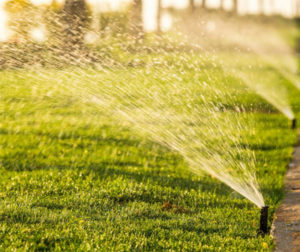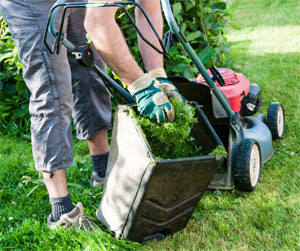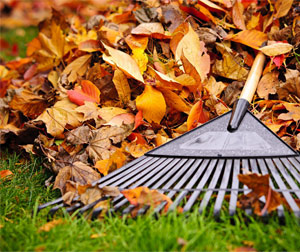There is a lot of information about lawn care floating around out there. Some of it is true. Some of it is not. The experts at Custom Lawn & Landscape have gathered some of the most popular lawn care myths to expose them for National Lawn Care Month. Read on to learn what to do and what not to do to get the best lawn this season.
Watering Myths
Myth #1: A Garden Hose Is More Cost Efficient Than Installing a Sprinkler System
Using a hose to water your lawn may be more ineffective than you realize. People who water their lawn by hand have been known to overwater certain areas, while leaving others areas of their lawn thirsty. This can quickly lead to overwatering, brown patches, and an increase in your water bill. It’s really a guessing game for the homeowner.
But, due to recent advances in technology, today’s sprinkler systems are able to conserve more water than ever. Most newer sprinkler systems have smart technology like rain sensors and soil moisture sensors that can help regulate watering times.
By knowing how much moisture is in the soil (say from a frequent rain) these sensors prevent the automated system from watering when it’s not necessary.
These more advanced systems also produce larger water droplets that are more wind resistant to deliver water to the desired areas at a slower pace. Updating your irrigation system can save you up to 20% on your water bill.
Myth #2: You Can Water Your Lawn and Landscape Any Time of Day
The best time is early in the morning from 4 am to 10 am. Watering at night is about the worst thing to do for a lawn because the water stays on the grass without the sun to burn in off and the warm weather and darkness combined promote mildew and fungus growth. Watering during the hottest part of the day allows much of the moisture to be evaporated by the sun rather than soak into the soil.
Myth #3: It’s Best to Water Your Lawn Every Day
 Your lawn will do best when watered deeply and infrequently. Watering every day doesn’t promote deep root growth.
Your lawn will do best when watered deeply and infrequently. Watering every day doesn’t promote deep root growth.
Longer, deeper waterings encourage deeper root growth and will prevent browning and burning during the hottest weeks of summer.
Mowing & Thatching Myths
Myth #4: Cutting Your Grass Short Decreases Mowing Frequency
While many people believe that lowering your blades and cutting your lawn shorter will decrease the frequency with which you have to mow, it actually damages your lawn. When cut too short, grass roots can be overexposed to the hot sun causing your lawn to turn brown.
It can also encourage weed growth as weeds fare better in drier, hotter conditions than grass. Ensuring your mower blade is raised during hot summer months will provide much needed shade to your lawn’s roots and will make for a greener and healthier lawn.
Myth #5: Leaving Grass Clippings on Your Lawn Will Create Thatch
 Grass clippings are mostly water and will break down quickly, returning nutrients to your lawn.
Grass clippings are mostly water and will break down quickly, returning nutrients to your lawn.
So, feel free to mulch those clippings right back into the yard without worry. It’s actually beneficial to your lawn.
Related Read: Save Time and Improve Your Lawn by Using This Lazy Man’s Mowing Tip
Myth #6: To Have a Healthy Lawn, You Must Dethatch Every Spring
Comprised of leaves, stems and roots – some living, some dead – thatch forms naturally in your lawn. It lies on top of the soil, a tightly woven layer beneath the visible grass blades. The brown on the surface at the beginning of the spring will slowly recede into the background all by itself as new grass grows. As long as it doesn’t get thicker than 1/2 to 3/4 of an inch, thatch actually contributes to your lawn’s health.
Myth #7: Spiked Shoes Will Aerate Your Lawn
Spiked shoes are not the best way to aerate your lawn. Aerating at least 5% of the soil surface will alleviate a compacted lawn. Spiked shoes will not accomplish that. Hollow-tine aeration is far more effective than solid-tine aeration, so your best course of action is to rent a core aerator or hire a pro.
Myth #8: You Have to Rake Your Leaves
 It’s true that a thick layer of leaves can smother grass if left for too long, a light or moderate layer of leaves can be simply mulched back into the lawn by mowing over them.
It’s true that a thick layer of leaves can smother grass if left for too long, a light or moderate layer of leaves can be simply mulched back into the lawn by mowing over them.
It’s much easier and faster than raking them all and it provides nutrients for the grass.
Just chop them into pieces the size of a dime or smaller and ditch that rake!
Fertilizer and Seeding Myths
Myth #9: Spring Is the Best Time to Seed
Since spring is the growing season and it rains often in the spring, it seems a reasonable assumption that it’s the best time to plant grass seed. That is not necessarily true. Depending on the type of grass you’re planting, it may be better to plant it in the fall.
For example, tall fescue is best suited for fall seeding because it has time to get established before the brutal heat of summer hits. So, first check to see what type of grass you’re growing before investing your time, energy, and money.
Related Read: 3 Reasons Why Fall Is the Best Time to Seed Your Yard
Myth #10: Grass Is Grass – It’s All the Same
Different varieties of grass have different requirements. Some need more shade to thrive while others need full sun. Some types of grass require more water than others. Certain grasses do better when cut at different lengths. If you are unsure as to what type of grass your lawn is made up of or what kind to overseed with, give us a call.
Myth #11: It’s Better for the Environment if I Do Not Fertilize my Lawn
The opposite is true. Research has shown that proper fertilization practices encourage a dense healthy stand of turfgrass. Only forest soils are better at removing all manner of pollutants from the environment before they reach groundwater.
Myth #12: If You See a Grub, You Have a Grub Problem
A few grubs are normal for any healthy lawn. In fact, they are beneficial because they aerate the soil. It’s having too many that can be harmful. Dig about four inches down. If you find 10 or more grubs in a single square foot, you should use a treatment.





